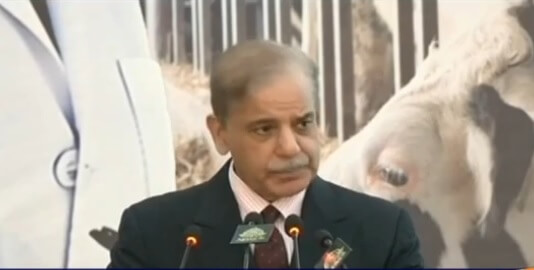Web Desk: Emphasising the enduring strength of Pakistan-China relations, Prime Minister Shehbaz Sharif on Wednesday credited Beijing for its pivotal support in securing Islamabad’s International Monetary Fund (IMF) deal, asserting that it would not have been possible without China’s backing.
Speaking at a ceremony held for the launch of a capacity-building programme that will send 1,000 agriculture graduates to China for training, the premier acknowledged China as one of Pakistan’s most sincere allies, always standing by the country during challenging times.
The remarks come in the backdrop of Pakistan’s agreement with the IMF on the first review of a 37-month Extended Fund Facility (EFF) worth $7 billion. Upon IMF Executive Board approval, Pakistan will gain access to approximately $1 billion, bringing total disbursements to $2 billion. An additional $2.3 billion is also expected to be approved within six weeks, likely by the first week of May 2025 — ahead of the federal budget.
Additionally, the IMF has proposed a new 28-month, $1.3 billion climate resilience programme, pending board approval.
During his address, PM Shehbaz reiterated his commitment to revitalising Pakistan’s agriculture sector, terming it essential for economic growth, food security, and improving farmers’ livelihoods. He stressed the importance of adopting modern farming techniques, digital crop management, and developing climate-resilient seeds, along with the urgent need to strengthen agricultural research institutions.
Under the capacity-building initiative, 300 agriculture graduates will be sent to China in the first phase for a three-month training programme. This will be followed by 400 graduates undergoing six months of training, and the final batch of 300 participating in another three-month programme.
Congratulating the first batch of graduates, the prime minister expressed hope that their training in China would translate into tangible contributions to Pakistan’s agriculture economy. Recalling his recent visit to Chinese universities, PM Shehbaz said he was deeply impressed by the quality of agricultural research and committed to replicating those practices in Pakistan.
He admitted that two earlier attempts to send graduates to China failed due to flawed selection processes, with most of the selected candidates being overaged government officials. To ensure transparency, an online portal was introduced for merit-based applications. “Now, I am glad to see that the selection process is transparent and purely merit-driven,” he noted.
The programme includes participation from across Pakistan, including Azad Jammu and Kashmir (AJK) and Gilgit-Baltistan, with a 10% increase in the quota for Balochistan.
The prime minister also revealed plans to offer subsidised loans to farmers to promote agripreneurship and value addition in fruits and vegetables.
Federal Minister for National Food Security Rana Tanveer Hussain highlighted that over Rs3 billion was being invested in the training programme, expressing confidence in the returning graduates’ ability to apply their learning effectively.
Chinese Ambassador Jiang Zaidong lauded Pakistan’s macroeconomic progress and reaffirmed Beijing’s commitment to enhancing bilateral cooperation, particularly in the agriculture sector. He noted that under the China-Pakistan Economic Corridor (CPEC), China has already invested approximately $35.4 billion in Pakistan.




